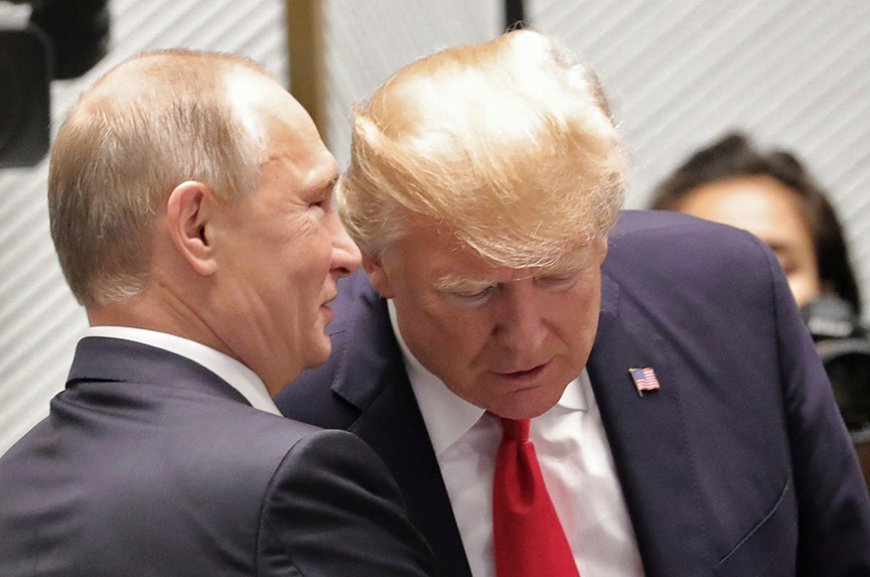Putin Offers U.S. Peace Deal in Exchange for Eastern Ukraine; Trump to Meet Russian Leader in Alaska on Aug. 15 as Zelensky Rejects Proposal
Putin proposes ending the Ukraine war in exchange for eastern territories. Trump to meet Putin in Alaska on Aug. 15. Zelensky rejects the offer outright.

In a dramatic turn in the ongoing Russia–Ukraine war, Russian President Vladimir Putin has privately communicated to Washington that he is willing to halt the war — but only if Ukraine cedes control of its eastern territories to Russia. The proposal, confirmed by senior diplomatic sources, has sparked intense debate across global capitals and drawn swift rejection from Ukrainian President Volodymyr Zelensky, who has vowed never to surrender Ukrainian land.
Former U.S. President Donald Trump, currently in office again, announced that he will meet Putin on August 15 in Alaska, marking the first face-to-face discussion between the two leaders since the war began in February 2022. The meeting, according to White House officials, will focus on assessing the seriousness of Putin’s offer, exploring potential ceasefire terms, and evaluating the broader implications for NATO and global security.
The Proposal: Ceasefire in Exchange for Territory
According to two senior Western diplomats briefed on the matter, Putin’s offer centers on an immediate ceasefire if Ukraine formally recognizes Russian control over Donetsk, Luhansk, and parts of Zaporizhzhia and Kherson — territories Moscow has occupied and partially annexed since 2022.
“This is not a peace plan. It’s a demand for Ukraine to accept the erasure of its borders and sovereignty,” one European Union diplomat told The Washington Post.
The Kremlin has not officially released details of the offer, but Russian state media have hinted for weeks that Moscow is seeking to secure “strategic victory” through diplomatic channels, particularly as battlefield advances have stalled in recent months.
Zelensky’s Response: ‘Not One Inch of Land’
President Zelensky issued a firm statement rejecting any notion of territorial concessions, calling Putin’s conditions “blackmail” and “a violation of the U.N. Charter.”
“We will never give up our land for promises of peace that Russia will break the next day,” Zelensky said during a televised address in Kyiv. “Ukraine’s borders are not negotiable.”
His stance echoes repeated Ukrainian government policy: that the war can only end when Russia withdraws fully from all occupied territories, including Crimea, which Moscow annexed in 2014.
Trump–Putin Meeting in Alaska
White House Press Secretary Laura Andrews confirmed on Tuesday that President Trump will meet Putin at an undisclosed location in Anchorage, Alaska, chosen for its symbolic position between Russia and the United States.
“President Trump believes dialogue is essential,” Andrews said. “He intends to hear directly from President Putin about his proposal and determine if there is a path toward ending this conflict without further escalation.”
The meeting has drawn both praise and criticism. Supporters argue that direct talks could de-escalate tensions, while critics warn that legitimizing Putin’s demands could undermine international law and embolden future territorial aggression.
For additional background on recent U.S.–Russia diplomacy, see this detailed analysis on geopolitical negotiations.
International Reaction
The proposal has divided the international community.
-
European Leaders: France and Germany have cautiously welcomed any effort toward peace but insist that Ukraine must make the final decision on territorial matters.
-
NATO: Secretary General Jens Stoltenberg reiterated that NATO will continue supporting Ukraine militarily and economically, regardless of negotiations.
-
China: Beijing has expressed support for “dialogue-based conflict resolution,” without explicitly endorsing Putin’s demands.
The Stakes for Ukraine
If Ukraine accepted Putin’s offer, it would lose nearly 20% of its territory and much of its industrial heartland. Military analysts warn that such concessions could destabilize Ukraine’s economy, weaken its defensive capabilities, and set a dangerous precedent for other authoritarian states seeking to redraw borders through force.
The conflict has already caused over 200,000 military and civilian casualties, displaced millions, and severely disrupted global food and energy supplies. Any peace deal that leaves Russian forces in control of Ukrainian territory could prolong instability in Eastern Europe for decades.
Next Steps
The August 15 Trump–Putin summit will be closely watched by world leaders, with expectations that it could either pave the way for a diplomatic breakthrough or deepen the geopolitical rift between Russia and the West.
Meanwhile, Ukrainian forces continue to fight fiercely along multiple fronts, as Western allies rush to deliver more advanced weapons and ammunition. The outcome of these talks could shape not only the future of Ukraine but also the global order in the post-war era.
For further updates on international responses to this development, read the latest global security briefing.











